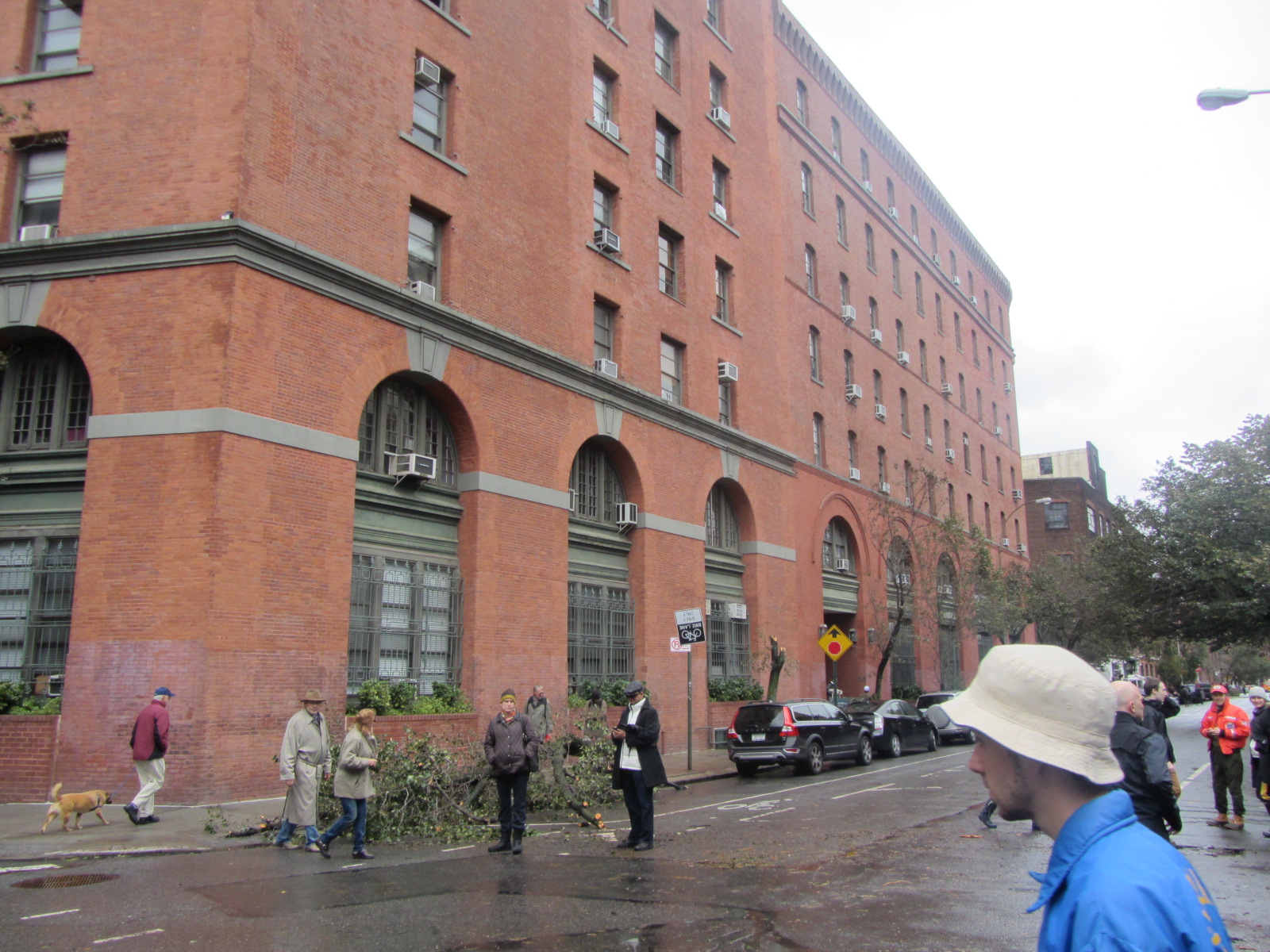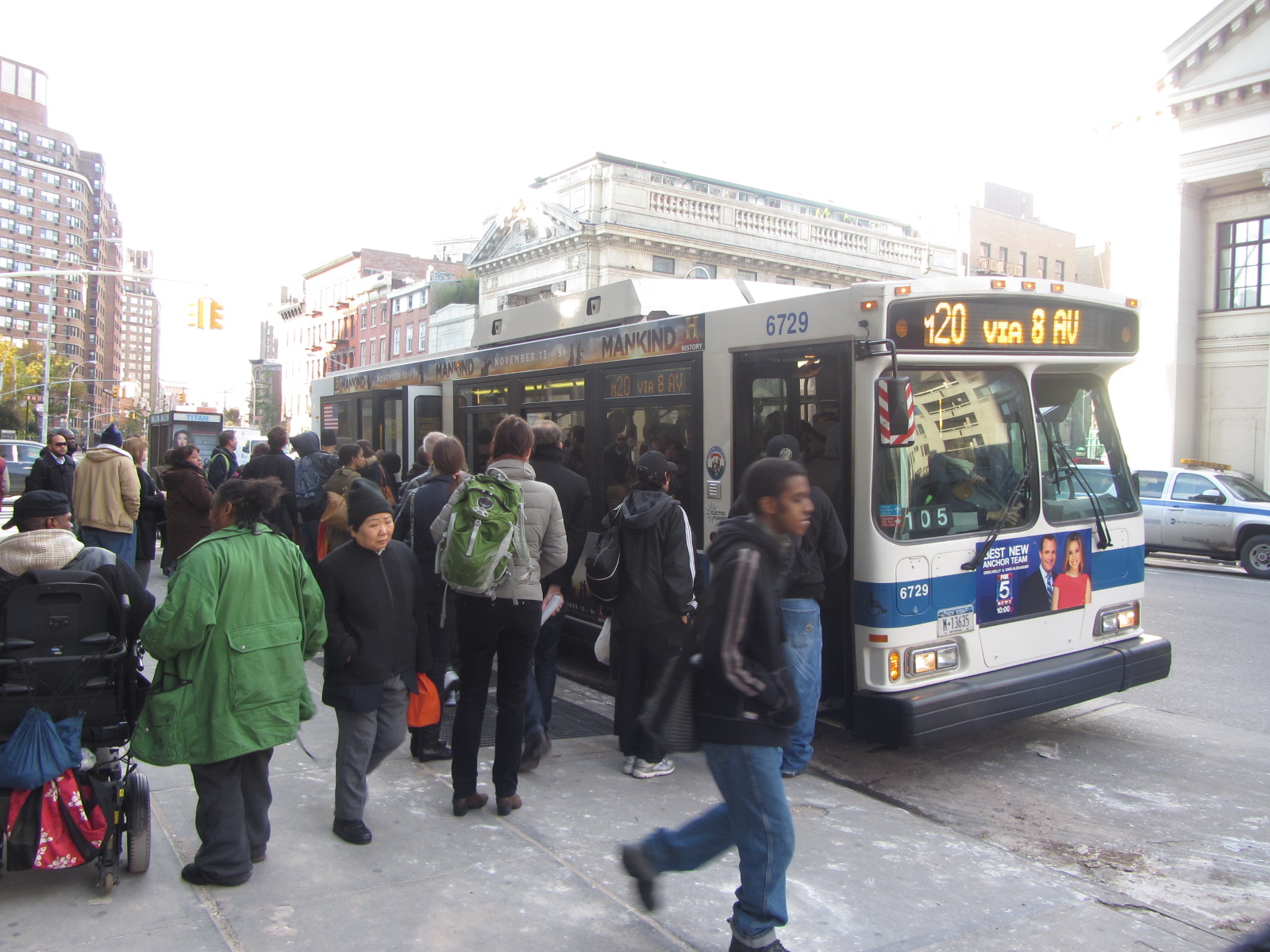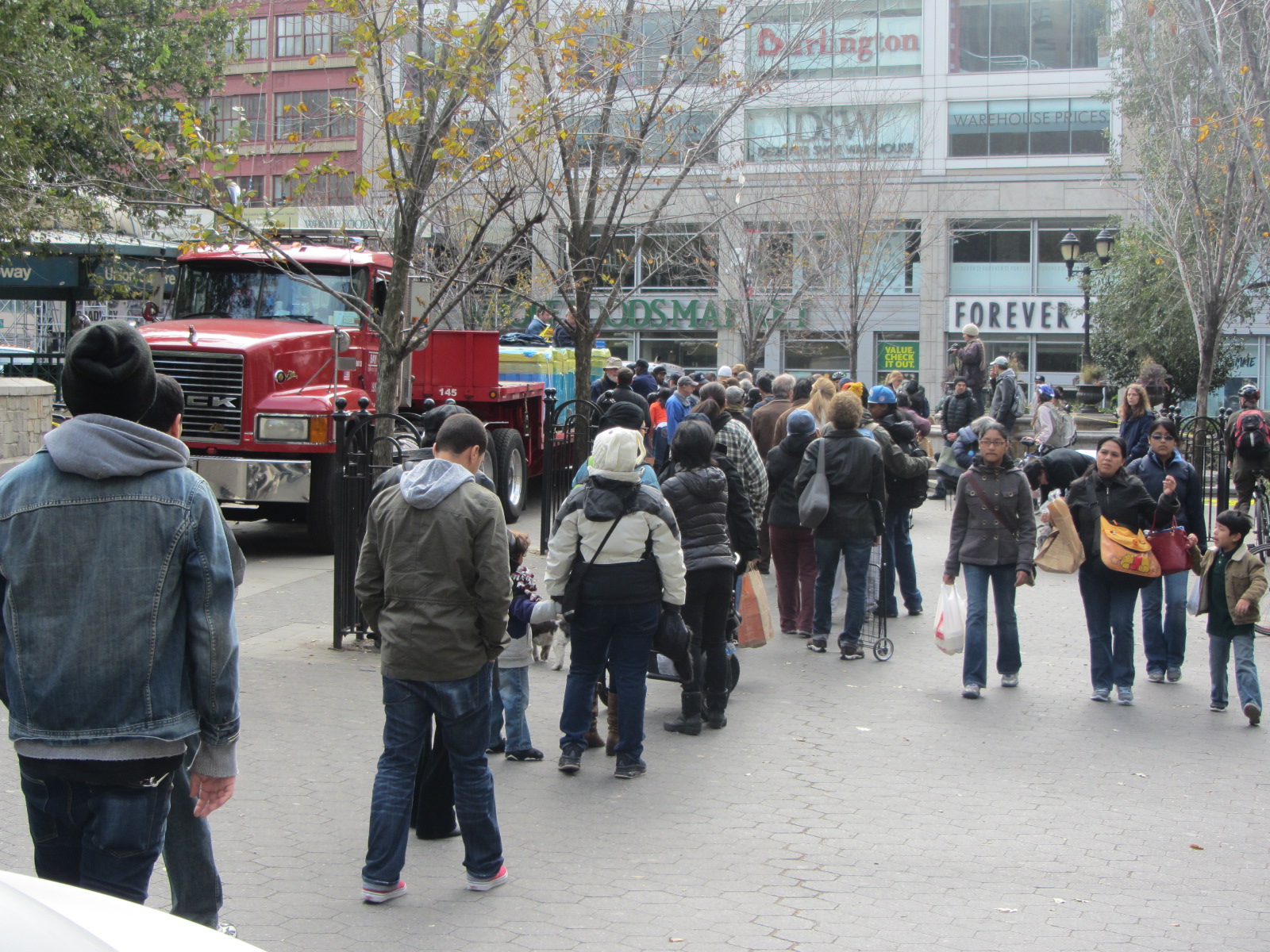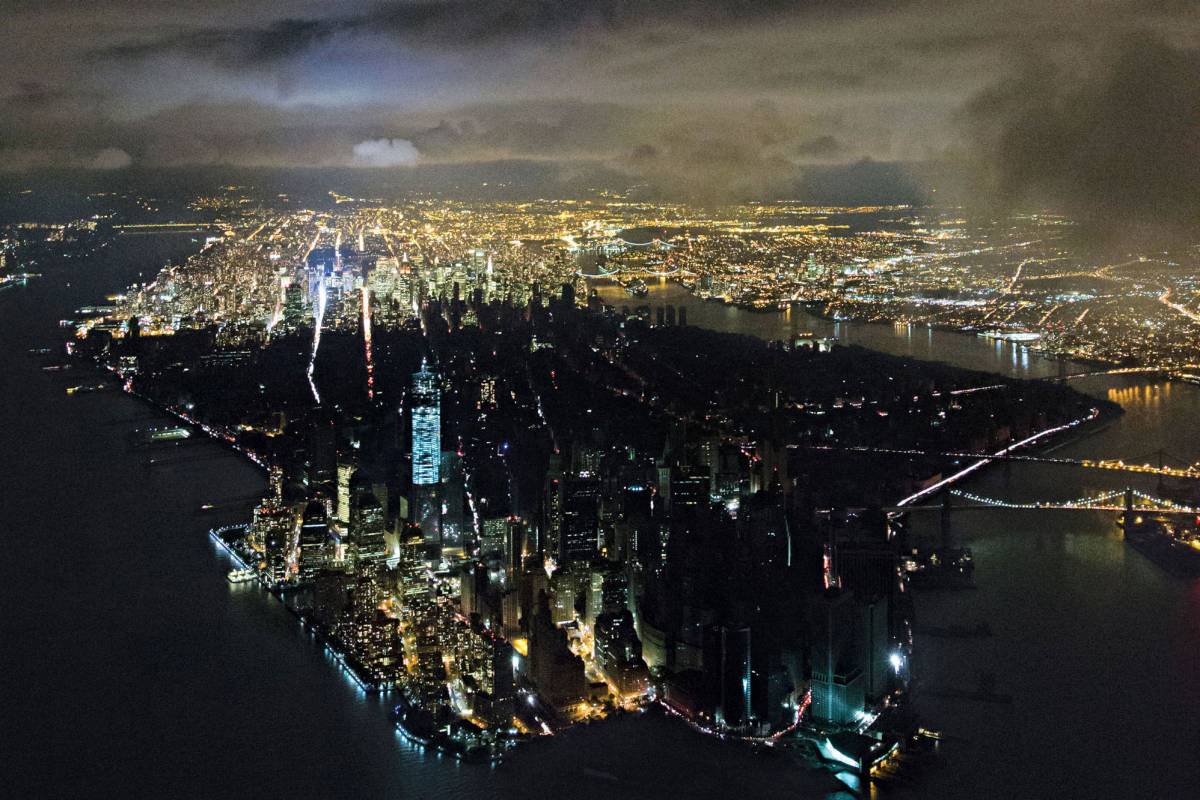
Allow Blocked Content? Yes!
This website checks your screen resolution |

|
Sandy: Into the Heart of Darknessby Barry Drogin |
The Sandy Blackout Zone Support Group is no longer meeting - information about it has been moved to this page.
Sunday, October 28, 2012: Pre-Sandy
   |
Children leave early to return to ex-wife's apartment, which is on border of Zone A and should have been evacuated. All MTA subway and bus service announced to cease at 7pm. My apartment is on border of Zone B.
Monday, October 29, 2012: Blackout
A Jurassic Park moment when toilet water is observed to be swaying slightly. Night-time television is pre-empted by news coverage. At 8:15pm, lights dim and then there is a brief power-outage which resets the computer and cable box. Five minutes later, the dim lights return, this time followed by a complete power outage at 8:20pm. Total darkness.
Children are okay but also in blackout, going to turn their cellphones off to preserve charge, realize this is a great idea and do the same. Light first of many Shabbas candles, search for transistor radio (never found). Eat ice cream before it turns to soup. Tinkle out a few notes on my piano to calm my nerves, crawl into bed and try to sleep with sounds of wind and rain at window.
Tuesday, October 30, 2012: Shopping in the Dark
Sunrise brings light into the apartment. Emergency lights in stairwell have died, need flashlight to go down five flights of stairs.
Venture outside (very light drizzle) to see that building has lost two trees at south side of building. A Hudson Street deli is open but you need a flashlight to shop the shelves. Buy muffins and croissants for breakfast, since milk will not be available for cereal. Batteries for flashlight are sold out. While I have light, spend day doing crossword puzzles. Call children again, they are alright but are playing "bored" games.
Local stationary store is selling batteries (four D's for $14), I figure people aren't buying many cards or other paper supplies, this is only instance of modest price gouging, they've been in neighborhood as long as I have, they could use the cash. All supermarkets and chain stores are closed.
I call rabbi on his cell and tell him situation, other synagogue members in Penn South have power from their own generator, and members above 31st Street on west side have power as well.
Neighbor suggests we should volunteer to cover security in dark. I volunteer for 2am to 4am shift, totally unnecessary as streets are dark and deserted and no one coming in or out. No burglars or looters.
Wednesday, October 31, 2012: Quest for Internet
Head is itchy, I could use a hot shower. Neighbors say that sports centers uptown are honoring members but no guests allowed. I head uptown. B&H store has Internet but restricts all external access. They suggest Starbucks or Library. Also, they're sold out of battery-operated radios. No mail delivery, downtown stores not getting delivery of The New York Times, midtown stores are all sold out. Downtown ATMs have no power, I go to Citibank near Macy's for cash. Walk to Mid-Manhattan Library on 5th Avenue and 40th Street, they are closed!
Find Burger King across from Port Authority with Internet access, $5 for 30 minutes. Internet connection is worst I have ever experienced, takes full 30 minutes to delete (not view!) 50 e-mails. Find street vendor with a New York Times! Wander to Manhattan Plaza to catch bus because my ankle is hurting, M11 finally arrives, pretty packed but people pull open back door and cram in. After sundown, I decide to try cooking by candlelight, make omelette, hard to wash dishes effectively in dark. That night I read New York Times cover-to-cover by flashlight. I can't use a heating pad or soak my ankle in a hot bath. I have trouble getting to sleep because I am accustomed to using my air purifier as a white noise generator. There is no sound at all - no street noise, nothing.
Thursday, November 1, 2012: Do-It-Yourself Info Gathering
I move into activist mode, take out Villager Community Handbook, only local government official listed is Christine Quinn, call office and leave voice message. I call The Villager, find out their office is flooded and they've moved uptown. I call synagogue member early before they go to work and they offer to let me take shower at their apartment in Penn South. I rush out door. Attempt to use uptown M20 bus is useless, I walk to Penn South (25th Street), pass bodega that is selling New York Times.
I take elevator to member's apartment. I take first hot shower! They have window in bathroom, but realize I can turn on light! This is first taste of normalcy since Monday night - turning on a bathroom light (it will turn out to be my only taste of normalcy all week). They let me use their Internet but their service is also atrocious. This time I have a few important messages, I write to friend in Amsterdam.
After I leave, I sit in Penn South park and call Quinn's office again. Get Jose on line, West Village rep Nudelman is trapped in outer borough. I tell him I know we can't get power but we can get things that power provides. He tells me that NY Sports Clubs are providing free showers to non-members. He tells me that he knows that Con Ed was passing out free dry ice at Union Square yesterday but doesn't know if they are doing it again, gives me Con Ed number to call. Turns out this will be first instance of government agencies and news outlets providing useless information - number is generic Con Ed number to report downed power lines and the like, no info on dry ice program. (But, to give him credit, his other info was good.)
M14 crosstown buses are running, decide to check out Union Square. Pass by my barber shop and they are open! Jump off bus, they have generator and no customers, indulge myself in haircut and old-fashioned shave with hot shaving cream and straight razor. This will be my one treat of the week. Con Ed is distributing dry ice in Union Square. Line is long but moves very quickly. They place plastic bags in paper bags with printed instructions. Catch M14 bus back across town. Stationary store is selling AM/FM radios at reasonable price (no more price gouging)!
Post info in lobby about NY Sports Clubs and Con Ed dry ice, along with Quinn telephone number and extension for West Village. Sit at Bleecker Street Park and listen to radio. They keep repeating a FEMA telephone number, this will be second instance of useless information.
At the lobby, my flashlight looks weak, so I put in fresh batteries and head back up the dark stairwell. Listening to radio in apartment, it is now about 6pm, NPR has a story about 16 FEMA distribution centers, including one in Chinatown which was supposed to have National Guard handing out water and meals, but line of people is waiting and, at 6pm, the troops haven't arrived yet and people are leaving and getting frustrated. The story also talks about how Sheldon Silver is driving around town with a charging truck, it is unclear to me whether distribution centers have generators for cellphone charging.
I decide to call 311 to find the location of the nearest distribution center, and to time how long it will take to get a 311 operator. While I am on hold I get messages about how I can visit NYC.gov/311 on-line. With 800,000 Con Ed customers without power (according to The Times), you'd think someone would realize that leaving up the old messages about on-line information would be really annoying to people without smartphones, Wi-Fi laptops, computer power, etc. It's Thursday night and in three days no one has realized how cruel and thoughtless this is. It takes 5 minutes to get a representative - not bad since I have landline. She insists on reading me list of FEMA distribution centers - apparently this is her instructions. Only 6 are in Manhattan. The last on the list is at 27th Street between 9th and 10th Avenue. From what I can tell, this is the closest one to me, but its location is absurd - uptown, four blocks from the blackout border, near Penn South. I ask her for the 1-800 FEMA number to confirm the address, and she gives it to me.
I call FEMA, three choices - file a claim, status of a claim, and speak to an operator. I choose option three, I am put on hold and told it may take 10 minutes or more. Turns out it takes exactly 10 minutes, and at 3 minutes they count you down. Very reassuring. I get a very nice FEMA operator, based in Texas, who has no idea where the distribution centers are. She only has a single address for a FEMA recovery center. She has Internet access and tries to find information about the distribution centers. She is very nice - she has been very well trained in how not to make people in a disaster situation feel frustrated - so her search is amusing, instead. While I am on the phone with FEMA, my flashlight suddenly goes out. Although I know it is very bad not to have a flashlight, the absurdity of losing use of a flashlight while on the line with FEMA overwhelms my worry.
Off the phone with FEMA, I focus in on my flashlight. The batteries are good, I must have used up the bulb reading The Times the night before. I have no spare bulbs (didn't think of that!). I decide to go out to buy a new flashllight. You may try to imagine how difficult it is to put two keys into two locks with a flashlight, without a flashlight it is exceedingly difficult. I open the door to get a little candlelight and pick the right keys, and try again in pitch dark blackness. After I lock the door, I wonder if this is a good plan. In complete darkness, I inch my way over to the stairwell door. I am telling myself I am going to fall down the stairs and kill myself. Later, I also tell myself that blind people have to deal with this all of the time. I figure out which way is down and very, very slowly descend two flights. By now I have figured out the pattern but it doesn't matter - someone else is coming down from above with a flashlight and leads me down the next three flights. (Learn weeks later about trick of using cellphone as flashlight.)
There are no street lights, some people are not carrying flashlights, walking isn't totally safe. Finally, at 29th Street, a grocery store with some little LED flashlights in stock. LED bulbs have a much longer life. I walk west to Ninth Avenue using the flashlight. I'm considering walking to 27th Street to check out the Distribution Center story but the bus comes and I can get on. The bus travels four blocks to 23rd Street and everyone is told to get off. This bus normally goes all the way down to Abingdon Square, the bus driver tells me it's not just him, after sundown all buses are told not to go below 23rd Street. In other words, all of downtown gets no subway service AND no bus service after sundown. You see, all of the street lights and traffic lights are out. Funny how none of the media outlets tell the 220,000 of us about this little MTA tidbit. I get off the bus and walk downtown into the heart of darkness. At least I have a flashlight.
Now I am back home and I have a radio for the first time, and I want to relax by candlelight and listen to some music on the radio. John Schaefer at WNYC SoundCheck is doing a special two hour show called "After the Storm" that is supposed to be devoted to listener suggestions of what music they have been listening to to get them through the storm, but is actually 90% talk and 10% snippets from listener suggestions - not even playing the whole song. I get through to the switchboard and beg them to play anything by Amy X Neuburg, but they thank me and hang up on me, I know it's not going to happen. Of course, I can also request songs on-line! At 11pm they switch to BBC news, which is useless. Once, during the incessant "go to our website" promos, do I hear a broadcaster acknowledge that listeners may not be able to do that. Once.
Friday, November 2, 2012: Heat and False Hope
The thermal mass of my building is starting to lose its heat capacity. It is not only colder outside but colder inside. My goal for the day is to spend the entire day uptown in warm spaces. The sunrise is no longer an enticement to enjoy the light. I am cold. I put on my winter coat. The radio confirms the Distribution Center story, so I make a second information sign, with additional info about 311, the FEMA number, and a local charging station. At the lobby, there is delivery of The New York Times, and the doorman gives away a few copies from people who have been gone for days. With Times in hand, I head for the M11 bus. The bus takes me to within a block of my synagogue.
I spend the morning in the synagogue reception hall, reading the Times. I bring my charger and charge my phone and my camera battery. I complete half of the Friday crossword puzzle and the easy Ken-Ken. It is a pleasant morning. I walk toward the Mid-Manhattan Library again (the newspaper says they are open), realize I have spent a lot of cash on the radio and pick up some more at an ATM. The library is open but availability of Internet access is 80 minutes later. I do not feel like taking a slip of paper and hanging around the library for over an hour.
I leave and find a hotel around the corner. On the second floor they have a business center with free Internet. For the first time in four days, I have high-speed Internet access. Unlimited, untimed, high-speed Internet access. I delete the unimportant stuff in my Inbox, and skim through the somewhat interesting stuff. My bank is offering to reimburse me for any fees I may incur at out-of-network ATMs. Nice. Other communications tell me to contact them by e-mail or by calling the number on the back of my cards. Communications people who get it. I write again to my friend in Amsterdam. I get an e-mail from the Manhattan Chamber of Commerce with a link to a Con Ed website with a map with information about power outages. This is the third piece of useless information. The map has a single flag in Lower Manhattan saying that a single customer had requested assistance. This is the Manhattan Chamber of Commerce?
I visit The Villager website, and they have some news stories and a video of the collapsed facade on Eighth Avenue that I am sure a million tourists have posted pictures of. The editorial, letters to the editor, and other features are still from the previous issue. I read the new stuff. My local newspaper.
I decide to eat lunch on 42nd Street. I finish the Friday puzzle and the harder Ken-Ken. I rip the address label off of the newspaper. There is a slightly older gentleman sitting across from me and he asks whether I am going to throw out the newspaper. I say he is welcome to have it. He is also dressed in a heavy winter coat like me, turns out he is also enjoying the warmth, he lives on 10th and Avenue C, he attends Orthodox services as well, we talk about local synagogues. I invite him to join me for Shabbas dinner at my synagogue as my guest, but it is getting late in the afternoon and he wants to get back to Avenue C before sundown. I understand.
I walk past Bryant Park and decide to sit and listen to the radio. I walk across 42nd Street to Eighth Avenue and decide to take the subway the one stop down to 34th Street. The train operator is yelling at people about what shuttle buses to take at 42nd Street as opposed to 34th Street. He doesn't speak so loudly when he has to announce that they are delayed. One stop later we all get off the train and I see him on the platform. I tell him he should enunciate and speak loudly, but he doesn't have to yell at us. He says, "You heard me, didn't you?" He thinks it's funny.
For some reason the synagogue is locked and no one is answering the doorbell, so I walk a block to a synagogue member's apartment house. He is on his way home and the doorman of his building allows me to sit in the warm lobby. I call the doorman of my building - power is still out. The synagogue member arrives home, he says that he passed by the synagogue and he thinks it is open now. I thank the doorman for letting me sit and walk to the synagogue.
It is very early but the reception hall is being set up for Shabbas dinner. My legs are cold and feeling sore, but I go to the kitchen and offer to help. There is nothing for me to do but they offer me some kugel. I want to save room for dinner, but you never say no to a Jewish mother, so I eat a little piece.
I don't want to go into a lot of detail about the six hours or so I spent at synagogue that Shabbas. The important detail is that a member told me that he heard there was power downtown, and that he had gotten tweets from two of his friends prior to Shabbas telling him they had power. As you can tell, the theme of this story has been receiving bad or wrong information. I had been considering asking some members of the synagogue whether they had a spare warm bed, because I knew that this last Friday night would be even colder, and would involve another long walk into the heart of darkness to get home. I decided there was a chance I had power.
It was getting late and I wanted to get home. As I got to the corner of Ninth Avenue the bus appeared, so I ran across the street to catch it. They announced they were going to 14th Street. Street lights and traffic signals were working below 31st Street now, and below 23rd Street, as far as the eye could see. The bus turned on 14th Street to let people off, and there it was again: the heart of darkness. After four days of holding it together in "survival mode," 5 hours before power was restored, I had let down my guard. I was undescribably upset.
I later thought that this was the traumatizing event that led to my acute traumatic stress disorder. In the middle of the night of December 16, 2012, I was awakened by a very upsetting nightmare in which I was in my synagogue with my go bag and the room suddenly plunged into darkness and I couldn't find my go bag. This is most similar to the initial moments of the power outage, when I had to walk slowly in the unexpected darkness to find my flashlight. But I think the most traumatizing event, the one where I truly feared for my life, was when my flashlight bulb died and I had to descend the stairwell in pitch black darkness. The other two events did not approach the level of fear for my personal safety that that event did, and it is common to suppress memories of a traumatizing event for months.
I will never forget these moments of darkness. You can't photograph it. A video won't do it justice. The only image I've come across that expresses in some way the enormity of the darkness is this photograph by Iwan Baan for New York magazine:

I couldn't sleep. There had been a radio story about people's mental health, and about how they should worry about things they could do something about, not about things they had no control over. They gave a 1-800 number. I had gone insane, but I wasn't about to check myself into Bellevue (which had been evacuated anyway). I called the 1-800 number. Turns out they had shut down for the night and transferred all calls to a suicide help-line. I explained to the gentleman that I was not suicidal. But at midnight, in the dark, in the cold, with just a candle, he let me vent for a while about how we had been fed so much bad information that we didn't believe in facts anymore. I started to believe that, like the Roman Empire, if we had become this corrupt, we really did deserve our downfall. Or something like that. He was a pretty good listener and I finally ran out of steam and wished him good night.
Saturday, November 3, 2012: First Light
At 4:25am, the Far West Village had its power restored. The refrigerator turned on, the Internet box eventually connected to Roadrunner, the Cable Box powered up and NY1 television is available. For five days I have been trying to hold it together and patiently wait for the light at the end of the tunnel. The light has come, and, instead of elation and celebration, I feel all of the frustration and anger and exhaustion and sadness. I am in a delicate state at synagogue. There are members who have had power the entire time, and members who have not. The members who have had power don't get it. They are making jokes and laughing and talking politics and I feel like a mourner at a funeral, I want some quiet compassion and understanding.
I want to go home. Now, the bus runs all the way down to Abingdon Square. The elevator is working. On the way up, I tell the elevator, "I love you. I miss you." We have a mail delivery. There is heat and hot water in the apartment. I sit down to write this story. By 8pm, the first draft is done. I am going to take a very long hot bath. And then like after 9/11, I will deal with the transition from acute traumatic stress disorder to post-traumatic stress disorder (this may take 4 weeks). Music will help.
Postscript: Triggers for my PTSD are sudden, complete, and total darkness; being put on hold on the telephone, and people who laugh nervously when talking about the Sandy blackout.
Treatments for PTSD all involve reliving the experience in a safe, controlled environment. Group therapy is one way to do this. Aversion therapy, in which the patient is slowly exposed to the trigger in another. PTSD never goes away, it is not curable, but with the use of proper therapies, its effect on functioning can be minimized.
What I Know Now:
My two cents:
This page © 2012 Barry Drogin